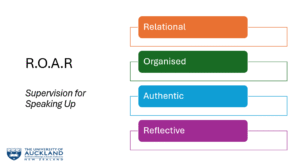I am the Director of Clinical Education for a Master’s in Speech-Language Therapy programme at the University of Auckland, New Zealand, where I provide both classroom teaching and clinical education. I am a practising Speech-language Therapist and enjoy engaging in research into supervision and clinical education innovations. I also provide supervision training and have recently submitted my PhD, which explored the speaking up experiences of allied health new graduates.
You can follow me on LinkedIn: linkedin.com/in/philippa-m-friary-a74a2143
In Part 1 of this blog, I shared insights from my doctoral study that explored the speaking up experiences of allied health new graduates using focus groups and a longitudinal interview study. When focusing on the data that related to supervision and speaking up, I developed R.O.A.R. – Supervision for Speaking Up. A framework that has been developed from discussions in interviews and focus groups with supervisors of new graduates and new graduates about the type of supervision that supports speaking up. The elements of this framework are Relational, Organised, Authentic and Reflective.
Below, I have expanded on each element of this framework and supported these with quotes from the participants.
Relational – this refers to the importance of the supervision relationship and the supervisor’s style in promoting an effective relationship.
“If they have really good relationships or they’ve felt good whakawhanaungatanga with someone in that hospital and then they come to work in that area it really helps them to feel supported.” (Supervisor)
“You know that the Māori word whakawhanaungatanga, like that, is … that’s what creates that bond and makes you feel like you know someone, they’re not just a colleague, and then you feel better about talking about your work things if you feel like they’re a little bit interested in you.” (New graduate supervisee)
Someone who was not experiencing a good supervisory relationship shared:
“I think I often feel like she just wants it to end and I feel like she doesn’t try and keep the conversation going like if we finish early she’ll be happy about that, which I kind of don’t like and then sometimes I just feel like I’m just talking about everything too much yeah I just don’t think we … haven’t really like warmed up to each other yet.” (New graduate supervisee)
Organised – this refers to the new graduate knowing their responsibilities in supervision, having supervision structures set up and also the supervisor being organised, which shows commitment and supports high trust. This element also includes being organised to bring in different activities into supervision for speaking up, for example, practising speaking up using role play, developing potential scripts and brainstorming different approaches.
“There was a perfect amount of space for me to actually feel listened to. And it’s like, well, yeah, like let’s try and find a solution, but like what are your thoughts on the situation? Can you think of things? Like what’s in your control that you can change, like yeah so that was good to like kind of like brainstorm ideas on what I can do.” (New graduate)
“So supervision is great, because then someone’s with you, from where you’re coming from and you can talk about that and figure out like does this need to be actioned or can I just, you know, let this sit for a while and yeah so then you’re keeping yourself, safe and your role, and you can live another day working in an old system or an organization that’s built bigger than you.” (New graduate)
Authentic – this element refers to the supervisory relationship and focuses on the importance of trust, which builds psychological safety and enables the sharing of mistakes. This element also includes the power of modelling of speaking up by the supervisor in contexts where the supervisor’s actions may be visible to the supervisee.
“I try and be quite open about mistakes that I’ve made along the way, because those are usually the ones I’ve learned the most from.” (Supervisor)
I feel like with her and I, although she’s got a lot more experience than me, I feel like we’re both learning, and we are both open to learning.” (New graduate)
“I think, yeah, I think it’s the openness, like, I do not feel judged at all by my supervisor, no matter what silly question I ask. And she is very open to share some of her experiences with me, when she first started, I think, so I feel more like it’s normal to be in the place that I’m at.” (New graduate)
“Within a medical review like this is one time, so I was with my mentor, which was really good for me to see her speak up.” (New graduate)
Reflective – new graduates with positive speaking up experiences often highlighted the role of reflective supervision. While previous studies have reported benefits of psychological safety (Alingh et al., 2019; Edmondson, 2018; Lukewich et al., 2015; Violato, 2022), leadership modelling of speaking up (Seo & Lee, 2022) and systems to support speaking up behaviour (Robbins & McAlearney, 2020), a literature review revealed no published studies specifically identified reflective supervision enabling speaking up. The new graduates in this study highlighted the benefits they received from reflection within supervision.
“They’re not actually telling you what to do so much as leading you to the conclusion yourself, and that probably helps instil the confidence, because you realise, actually, I came up with all this myself.” (New graduate)
“I feel like yeah I feel like my supervision doesn’t help me that well. Sometimes I feel like I feel like I’m doing so well and I talk through a client with my supervisor and then they say, ‘Oh you could also do this, you could do and you could also do this’. And I thought I was doing so well, I mean sometimes I come out with like I don’t know anything which is probably good in a way.” (New graduate)
“You can become more reliant on needing to hear from someone else what to do, versus trusting your own clinical decisions. So yeah, I don’t think it really helps as much with your confidence when someone’s just always giving you the answers, even though sometimes that’s what you want to hear yeah and sometimes you know.” (New graduate)
To conclude, although previous studies have focused on the role leaders play in creating positive speaking up environments, few have highlighted the vital role supervisors can play (Bisbey et al., 2021; Detert & Burris, 2007; Robbins & McAlearney, 2020; Seo & Lee, 2022; Umoren et al., 2022). The finding from this doctoral study, that effective supervision can promote speaking up, supports the development of more targeted training programmes for supervisors and supervisees, the ongoing promotion of the benefits of effective supervision and the importance in ensuring that all allied health staff are providing and receiving quality supervision.
By Philippa M. Friary
For further reading on the topics covered in this blog refer to:
Friary, P. M., Purdy, S. C., McAllister, L., & Barrow, M. (2021). Voice behavior in healthcare: A scoping review of the study of voice behavior in healthcare workers. Journal of Allied Health, 50(3), 242–249.
Friary, P. M., Purdy, S. C., McAllister, L., Barrow, M., & Martin, R. (2023). A realist informed study on speaking up in healthcare – Supervisors’ perceptions of new graduates speaking up. The Internet Journal of Allied Health Sciences and Practice, 21(2), 1–9. https://doi.org/10.46743/1540-580X/2023.2294
Friary, P. M., Purdy, S. C., McAllister, L., & Martin, R. (2023). Speaking up in healthcare: An exploration of the allied health new graduate workforce. Internet Journal of Allied Health Sciences and Practice, 21(1), 5. https://doi.org/10.46743/1540-580X/2023.2314
Friary, P. M., McAllister, L., Martin, R., Purdy, S. C., & Barrow, M. (2024). Allied health new graduates’ voice behavior – New perspectives using realist synthesized narratives. Journal of Health Organization and Management. https://doi.org/10.1108/JHOM-06-2023-0199
Friary P. M., et al. Combining realist and narrative methods to explore speaking up in healthcare – A methods paper [Manuscript in preparation]. University of Auckland.


